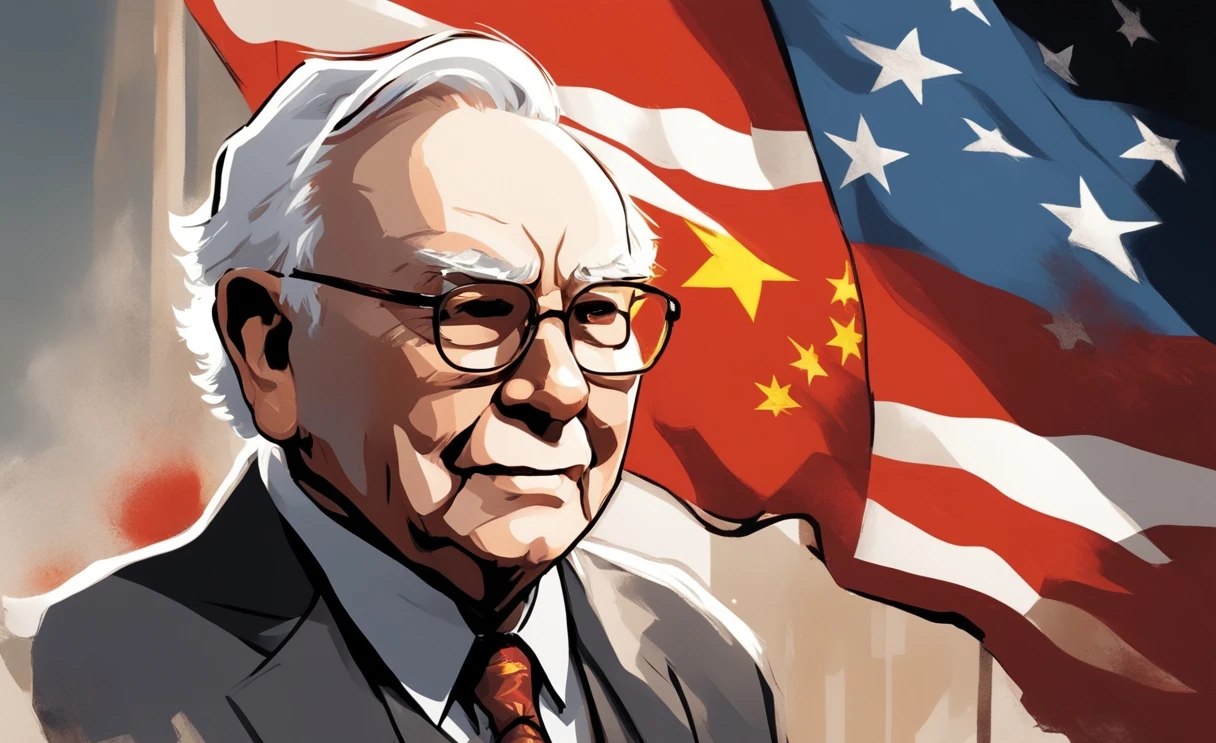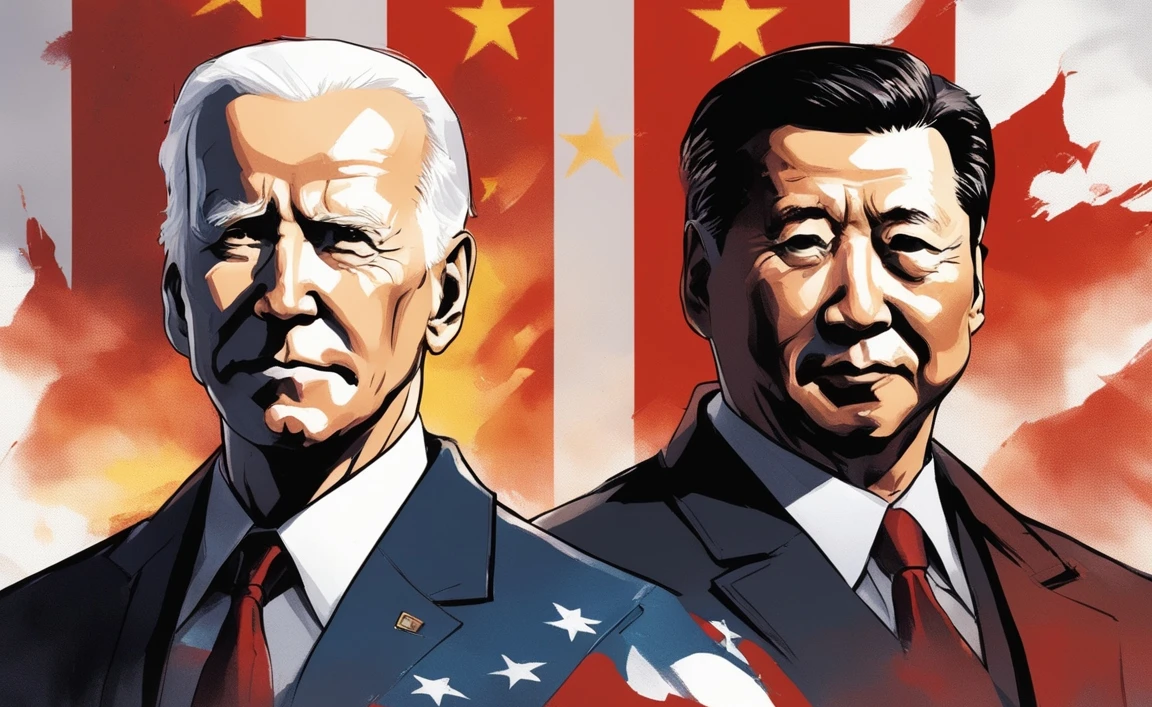Tags: BYD / Charlie Munger
This fanpage is not officially affiliated with Berkshire Hathaway: Disclaimer
Since 2022, Berkshire Hathaway is slowly but surely divesting from BYD. Discover the real reasons behind this move and gain valuable insights into a volatile global landscape with geopolitical tensions.

Introduction
In a move that has captured the attention of investors and market analysts alike, Warren Buffett’s Berkshire Hathaway has been gradually reducing its stake in BYD, a prominent Chinese new energy vehicle (NEV) manufacturer. This strategic divestment marks a significant shift for Berkshire Hathaway, which has been a long-term investor in BYD since 2008 1. The historical context of this investment is noteworthy, as it was a bold move during a time when the global financial crisis was at its peak.
For Berkshire Hathaway's shareholders, understanding the implications of this exit strategy is crucial. The purpose of this article is to delve into the real reasons behind Berkshire’s divestment from BYD, offering a comprehensive analysis that encompasses historical, political, and economic insights. By doing so, we aim to provide a clearer picture of the factors influencing this decision and its potential impact on Berkshire Hathaway's portfolio.
This article will take a multifaceted approach, beginning with a look back at the initial investment in BYD, followed by an examination of the company's impressive growth and market position. We will then explore the geopolitical tensions and trade wars that may have influenced Berkshire's strategy, before considering Berkshire's broader strategic positioning. Finally, we will speculate on the real reasons behind the exit, drawing on a range of insights and evidence.
By the end of this article, readers will have a deeper understanding of the complex interplay of factors that have shaped Berkshire Hathaway's decision to reduce its stake in BYD, and what this means for the future.
Berkshire's Historical Investment in BYD and Gradual Exit
The story of Berkshire Hathaway's investment in BYD begins in September 2008, during a period of global economic turmoil. At that time, Berkshire Hathaway invested $230 million in BYD, acquiring 225 million shares at HKD 8 per share 1. This investment was spearheaded by Charlie Munger, Warren Buffett’s long-time business partner, who saw immense potential in BYD’s vision for the future of electric vehicles. Buffett himself has given full credit to Munger for identifying this opportunity 1. Thank you Charlie, once again ↗!
Over the years, BYD has grown from a relatively obscure player in the automotive industry to a global leader in new energy vehicles. The company’s rise has been nothing short of meteoric. BYD surpassed Tesla Inc. to become the world's largest seller of electric vehicles (wow!) 2, a testament to its innovative approach and commitment to green energy. Notably, BYD ceased production of fossil-fueled vehicles in March 2022, fully dedicating its efforts to the development of electric and hybrid vehicles 6.
BYD's achievements extend beyond its sales figures. The company has made significant strides in vertical integration, producing most of its components in-house, including its proprietary Blade battery 6. This level of control over its supply chain has enabled BYD to maintain a competitive edge in the rapidly evolving NEV market.
BYD's commitment to innovation and sustainability has been a driving force behind its success. The company has expanded its market reach, selling vehicles in Europe, Southeast Asia, Oceania, and Latin America 6. This global expansion has solidified BYD's position as a leader in the NEV sector, making it a valuable asset in Berkshire Hathaway's portfolio for many years.
As we move forward, it is essential to understand the broader context and factors that have influenced Berkshire Hathaway's decision to gradually exit its investment in BYD. The saga of Berkshire Hathaway's gradual exit from BYD is a tale of strategic divestment that has captured the attention of investors and market analysts alike. The journey began in August 2022, when Berkshire made its first significant move by selling 1.33 million shares, reducing its stake from 20.04% to 19.92% 2 ↗. This initial sale was a precursor to a series of calculated reductions that would follow over the next two years.
By June 2024, Berkshire's stake in BYD had dwindled to 5.99%, marking a substantial divestment from its once formidable position 1. The numbers tell a compelling story: on June 11, 2024, Berkshire trimmed its holdings by 1,347,500 shares, lowering its stake from 7.02% to 6.9% 1. A mere eight days later, another 2,017,500 shares were sold at an average price of HKD 234.57 per share, amounting to a transaction worth HKD 470 million 1.
To provide a clearer picture of Berkshire's investment journey with BYD, here is a summary of key milestones:
| Date | Berkshire Hathaway's BYD Investment Milestone |
|---|---|
| September 2008 | Berkshire Hathaway invests $230 million in BYD, acquiring 225 million shares at HKD 8 per share. |
| August 2022 | Berkshire sells 1.33 million shares, reducing its stake from 20.04% to 19.92%. |
| June 2024 | Berkshire further reduces its stake, holding less than 6% after multiple sales. |
The impact of these sales on BYD's share price was immediate and significant. Following the initial sale in August 2022, BYD's share price plummeted nearly 12% 2. This reaction underscored the market's sensitivity to Berkshire's investment decisions, given the firm's reputation and influence.
Interestingly, throughout this period, Berkshire Hathaway maintained a shroud of silence regarding its plans to sell individual stocks. The (usual) absence of public announcements left many to speculate about the underlying motives and strategic considerations driving these decisions 2.
BYD's Strong Performance and Market Position
Amid Berkshire's gradual exit, BYD has demonstrated remarkable resilience and robust performance, solidifying its position as a leader in the new energy vehicle (NEV) sector. In May 2024, BYD's shares surged 7.2% following quarterly results that exceeded earnings expectations by 14%, despite revenue falling slightly short of analyst estimates 3. Analysts have since updated their earnings models, forecasting revenues of CN¥729.4 billion and earnings per share of CN¥11.71 for 2024 3.
BYD's achievements extend beyond financial metrics. The company garnered international acclaim by winning the "2023 Japan EV of the Year" award, with the BYD DOLPHIN securing the "Grand Prix" and the BYD ATTO 3 ranking third 4. These accolades highlight BYD's innovative prowess and its ability to cater to diverse markets with high-quality electric vehicles.
Production milestones further underscore BYD's dominance in the NEV landscape. The company celebrated the rollout of its 7 millionth new energy vehicle, the DENZA N7, at its Jinan factory in China 5. This achievement reflects a meteoric rise in production, with BYD reaching the 1 million mark in May 2021 and rapidly accelerating to 7 million units by 2024 5.
BYD's global footprint is equally impressive. The company has expanded its new energy passenger vehicle sales to 64 countries and regions, with overseas sales in 2023 exceeding 240,000 units, marking a 337% year-on-year growth 5. This international presence is bolstered by BYD's commitment to zero-emission energy solutions and its strategic partnerships, such as becoming the official partner of the UEFA European Football Championship 2024™ 5.
With a solid track record and an excellent balance sheet, BYD continues to outpace industry growth rates, maintaining its status as the top seller of new energy passenger vehicles in China for 11 consecutive years 5. The company's focus on pure electric and plug-in hybrid vehicles aligns with global trends towards greener transportation solutions, positioning BYD as a formidable player in the automotive industry.
Here's an interesting documentary on BYD's success in the recent years. Elon Musk did not approve of the company a couple of years ago - "Have you seen their cars?". Now it's a completely different story:
Geopolitical Tensions and Trade Wars
The landscape of global trade has been dramatically reshaped by escalating geopolitical tensions and trade wars. The friction between the United States and China, two of the world's largest economies, has particularly intensified, impacting various sectors, including automotive and semiconductors.
The trade war began in earnest during President Trump's administration, which saw the imposition of punitive tariffs on Chinese goods in 2018 and 2019 7. These measures aimed to address issues such as intellectual property theft and unfair trade practices by China. However, the situation did not ease with the change in administration. President Biden has not only maintained these tariffs but has also introduced new measures to further protect American interests 8 ↗.
One of the most significant areas affected by these tariffs is the automotive industry, particularly the electric vehicle (EV) sector. The Biden administration has announced a substantial increase in tariffs on electric vehicles, which will rise from 25% to 100% in 2024 8. This move is part of a broader strategy to bolster domestic manufacturing and reduce reliance on Chinese imports. Similarly, tariffs on lithium-ion EV batteries will increase from 7.5% to 25% in 2024, reflecting the strategic importance of these components in the burgeoning EV market 8.
The semiconductor industry has also been a focal point of these trade tensions. The Biden administration has cut off U.S. exports of advanced semiconductors and chip-making equipment to China, aiming to curb China's technological advancements and protect U.S. national security interests 7. Additionally, tariffs on semiconductors will double from 25% to 50% by 2025 8, further complicating the global supply chain dynamics.
These measures are not isolated incidents but part of a concerted effort to address the broader geopolitical landscape. For instance, the Biden administration has directed the U.S. Trade Representative to increase tariffs on $18 billion of imports from China under Section 301 of the Trade Act of 1974 8. This includes significant increases in tariffs on steel and aluminum products, which will rise to 25% in 2024 8. These industries are critical not only for their economic value but also for their strategic importance in national security and infrastructure.
The impact of these geopolitical tensions extends beyond tariffs. Companies like TSMC, the world's largest chipmaker, have also felt the repercussions. Warren Buffett's Berkshire Hathaway sold its remaining shares in TSMC, citing concerns about the geopolitical risks associated with Taiwan, where TSMC is based 9 ↗. Despite Buffett's praise for TSMC as one of the best-managed and most important companies globally, the geopolitical risks were deemed too significant to ignore 9.
Thus, the ongoing trade tensions between the U.S. and China have far-reaching implications for global supply chains and investment decisions. Key measures affecting the automotive and semiconductor sectors include:
- Tariffs on electric vehicles increasing from 25% to 100% in 2024 8.
- Tariffs on lithium-ion EV batteries rising from 7.5% to 25% in 2024 8.
- Tariffs on semiconductors doubling from 25% to 50% by 2025 8.
- Tariffs on steel and aluminum products increasing to 25% in 2024 8.
These measures underscore the strategic importance of these sectors and the need for companies to navigate the complexities of geopolitical risks in their investment strategies. So, what does Berkshire do?
Berkshire's Strategic Positioning
In the face of escalating geopolitical tensions, Berkshire's approach to managing these risks has become even more critical. As outlined, the divestment from TSMC is a prime example of Berkshire's strategic positioning in response to geopolitical risks. Despite recognizing TSMC as one of the best-managed and most important companies in the world, Buffett cited concerns about Taiwan's geopolitical stability as the primary reason for the sale 9. This decision highlights the importance of geopolitical considerations in Berkshire's investment strategy, even when it involves well-managed and highly valuable companies.
The parallels between the TSMC and BYD divestments are striking. Both decisions were influenced by the broader geopolitical landscape and the associated risks. In the case of BYD, the ongoing trade tensions between the U.S. and China and the increasing tariffs on critical sectors like electric vehicles and batteries played a significant role. These geopolitical factors necessitated a reassessment of the investment's risk profile, leading to a gradual exit strategy.
Berkshire's strategic positioning amidst these geopolitical tensions is not just about divestment but also about protecting shareholder value and managing risks in a volatile global environment. The company has demonstrated a keen awareness of the broader geopolitical dynamics and has taken proactive steps to mitigate potential risks.
For instance, Berkshire's decision to exit TSMC was not an isolated move but part of a broader strategy to navigate the complexities of geopolitical risks. By divesting from companies exposed to significant geopolitical uncertainties, Berkshire aims to safeguard its investments and ensure long-term stability for its shareholders.
Moreover, Berkshire's approach to managing geopolitical risks extends beyond divestments. The company has made other strategic moves in response to geopolitical tensions, such as investing in sectors less exposed to these risks and diversifying its portfolio to spread potential vulnerabilities.

Speculations on the Real Reasons for Exiting BYD
Berkshire Hathaway's decision to gradually exit its investment in BYD has sparked widespread speculation. While the conglomerate has not provided explicit reasons for its move, several factors, particularly geopolitical tensions and trade wars, seem to be at play.
Let us go through them, one by one.
1. Geopolitical Tensions and Trade Wars. The escalating trade war between the U.S. and China has created a precarious environment for companies operating across these two economic superpowers. The Biden administration has maintained and even expanded upon the punitive tariffs initially imposed by President Trump in 2018 and 2019 7. These tariffs have significantly impacted sectors critical to BYD's operations, such as electric vehicles (EVs) and batteries.
2. Impact of Increased Tariffs on BYD's Business. One of the most striking moves by the Biden administration is the planned increase in tariffs on electric vehicles from 25% to 100% in 2024 8. This dramatic hike could severely affect BYD's competitiveness in the U.S. market, making their EVs considerably more expensive compared to domestic alternatives. Additionally, the tariff rate on lithium-ion EV batteries is set to rise from 7.5% to 25% in 2024 8, further squeezing BYD's margins and potentially leading to higher costs for consumers.
3. Risks Associated with China's Dominance in the EV Battery Supply Chain. China's control over 80% of certain segments of the EV battery supply chain poses another significant risk 8. The Biden administration's strategic focus on bolstering domestic production of advanced batteries, with nearly $20 billion in grants and loans, aims to reduce this dependency. However, this shift could disrupt supply chains and increase operational risks for companies like BYD that rely heavily on Chinese-manufactured components.
4. Broader Context of U.S.-China Trade Relations. The broader context of U.S.-China trade relations suggests a potential for further escalation. The Biden administration has not only maintained existing tariffs but has also cut off U.S. exports of advanced semiconductors and chip-making equipment to China 7. These measures, coupled with support from allies like the EU, Japan, and the UK, indicate a concerted effort to curb China's economic influence. Berkshire Hathaway, known for its prudent investment strategies, might be anticipating further disruptions and uncertainties in this volatile climate.
5. Risk Management in frame of Regulatory and Political Uncertainties. Risk management is a core principles of Berkshire Hathaway's investment strategy - "Never lose money". The conglomerate's gradual exit from BYD could be seen as a move to mitigate exposure to the regulatory and political uncertainties surrounding U.S.-China trade relations. By reallocating resources to more stable and predictable markets, Berkshire aims to safeguard its portfolio against unforeseen geopolitical shifts. Furthermore, the regulatory landscape is becoming increasingly complex, with new policies and tariffs being introduced at a rapid pace. The Biden administration's aggressive stance on protecting American industries and workers from China's seemingly unfair trade practices 8 adds another layer of uncertainty for foreign investments.
For Berkshire Hathaway, navigating these turbulent waters requires a keen understanding of global dynamics and an ability to adapt swiftly to protect shareholder interests. Berkshire Hathaway's exit from BYD appears to be a strategic decision influenced by a confluence of factors, primarily geopolitical tensions, increased tariffs, and the need for to adjust for regulatory and political uncertainties.
Although BYD appears to be a fantastic company, external political factors may make further investment too risky and uncertain for Berkshire Hathaway. Given Charlie Munger's legacy of strong support for free trade, we can only hope that conditions will improve, making such investments viable again in the future.

Conclusion
The unveiling of Berkshire Hathaway's exit strategy from BYD has shed light on a complex interplay of factors that have influenced this strategic decision. The historical context of Berkshire's initial investment in BYD in 2008, spearheaded by Charlie Munger, set the stage for a long and fruitful partnership with the Chinese new energy vehicle manufacturer. However, as geopolitical tensions and trade wars escalated between the U.S. and China, Berkshire Hathaway's gradual divestment from BYD became a strategic imperative.
The geopolitical landscape, characterized by punitive tariffs on critical sectors like electric vehicles and batteries, posed significant challenges for companies operating in the crosshairs of U.S.-China trade relations. Berkshire's strategic positioning in response to these risks underscored the importance of proactive risk management and diversification to protect shareholder value. The company's decision to exit TSMC, citing geopolitical risks associated with Taiwan, mirrored its cautious approach to managing uncertainties in volatile global environments.
Despite Berkshire's ongoing exit from BYD, the Chinese NEV manufacturer has continued to demonstrate robust performance and market leadership, with accolades, production milestones, and international expansion marking its success. BYD's resilience in the face of geopolitical challenges highlights the company's innovative prowess and commitment to sustainability.
Looking ahead, shareholders of Berkshire Hathaway are encouraged to consider the broader context of global trade dynamics and political uncertainties when evaluating investment opportunities. Staying informed about market trends, geopolitical risks, and strategic positioning will be crucial in navigating the evolving landscape of international business.
As Berkshire Hathaway remains committed to managing risks and protecting shareholder value, shareholders can expect the company to adapt and reposition its investments in alignment with changing global dynamics. By leveraging its expertise and strategic acumen, Berkshire Hathaway aims to uphold its legacy of delivering strong returns and sustainable growth for its investors.
References
-
Warren Buffett’s Berkshire slashes BYD stake to 5.99% - www.teslarati.com ↩↩↩↩↩↩
-
Buffett's Berkshire sells 1.3 million BYD H-shares for $47 million - finance.yahoo.com ↩↩↩↩
-
BYD Company Limited Just Beat Analyst Forecasts, And Analysts Have Been Updating Their Predictions - simplywall.st ↩↩
-
Two BYD Models Triumph at the "2023 Japan EV of the Year" Awards - www.byd.com ↩
-
BYD Rolled Off Its 7 Millionth New Energy Vehicle - www.byd.com ↩↩↩↩↩
-
BYD Auto - Wikipedia - en.wikipedia.org ↩↩↩
-
China-U.S ↗. Trade Tensions Become Still More Intense - www.forbes.com ↩↩↩↩
-
FACT SHEET: President Biden Takes Action to Protect American Workers and Businesses from China’s Unfair Trade Practices | The White House - www.whitehouse.gov ↩↩↩↩↩↩↩↩↩↩↩↩↩↩
-
Warren Buffett’s Berkshire Hathaway sells entire stake in TSMC | CNN Business - edition.cnn.com ↩↩↩











